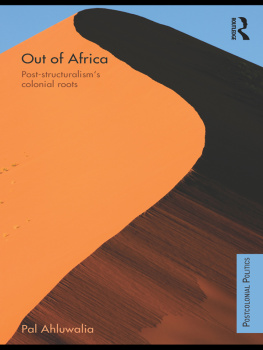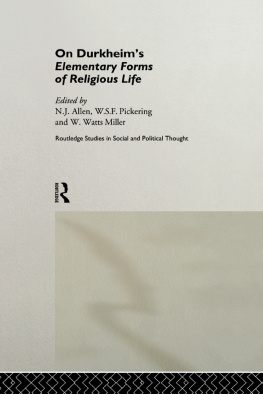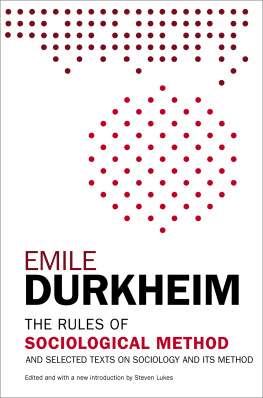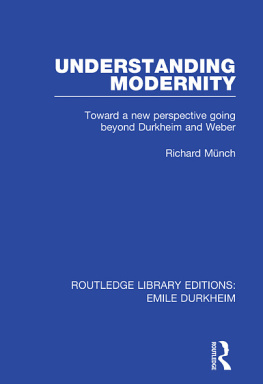
Deconstructing Durkheim
This study provides a close textual analysis of Durkheimian sociology from the standpoint of critical structuralism. Durkheims social ontology is analyzed as a sociologistic theory of reality riven by an apparent tension between social determinism and individualism. This tension is probed to reveal its ultimate resolution in an absolute social determinism. This social determinism is then scrutinized, as a potential affinity between Durkheimianism and structuralism. It is demonstrated that Durkheims social determinism, while absolute, is co-extensive with an ontological collective subjectivism. The author concludes that Durkheims socio-ontology is wholly incompatible with structuralist socio-ontology.
Durkheims epistemology is analyzed as a sociological theory of knowledge, engendering an apparent tension between social relativism and scientific rationalism. This tension is examined to reveal its ultimate resolution in an absolute scientific rationalism. This scientific rationalism is then scrutinized as a potential affinity between Durkheimianism and structuralism. It is demon strated that Durkheims scientific rationalism is co-extensive with an epistemological collective subjectivism. The author concludes that Durkheimian socio-epistemology is wholly incompatible with structuralist socio-epistemology.
The central principle of Durkheimian sociology is identified as organicism. Organicism is found to produce the distinctive Durkheimian socio-epistemology, collective subjectivism, and to situate Durkheimian social theory in the paradigm of structural functionalism. It marks an absolute distinction between Durkheimian and structuralist onto-epistemologies. Dissecting the body of Durkheims work is intended to reveal the structural functionalist morphology of his theory, and to demarcate Durkheimian structural functionalism from post-Saussurian and critical structuralism.
Jennifer M. Lehmann is Professor of Sociology and Womens Studies at the University of Nebraska, Lincoln.
Deconstructing Durkheim
A post-post-structuralist critique
Jennifer M. Lehmann
First published in 1993
by Routledge
11 New Fetter Lane, London EC4P 4EE
Simultaneously published in the USA and Canada
by Routledge
29 West 35th Street, New York, NY 10001
New in paperback 1995
1993 Jennifer M. Lehmann
Typeset in Linotron Baskerville by
J&L Composition Ltd, Filey, North Yorkshire
Printed and bound in Great Britain by
Mackays of Chatham PLC, Chatham, Kent
All rights reserved. No part of this book may be reprinted or reproduced or utilized in any form or by any electronic, mechanical, or other means, now known or hereafter invented, including photocopying and recording, or in any information storage or retrieval system, without permission in writing from the publishers.
British Library Cataloguing in Publication Data
A catalogue record for this book is available from the British Library.
Library of Congress Cataloging in Publication Data
Lehmann, Jennifer M., 1956
Deconstructing Durkheim: a post-post-structuralist critique / Jennifer M. Lehmann.
p. cm.
Includes bibliographical references and index.
1. Durkheimian school of sociology. 2. SociologyPhilosophy.
3. Deconstruction. I. Title.
HM22.F79L44 1993
301.01dc20
92-28815
CIP
ISBN 0415070392 (hbk)
ISBN 0415123747 (pbk)
This book is dedicated to my father, Wesley A. Lehmann (192092), who asked me how many pages I had written every week until the first manuscript was finished, and how many pages I had eliminated every week until the final manuscript was finished.
Contents
This text would not have been written without Ben Agger at SUNY/Buffalo. I owe Ben the irredeemable debt of what is now about twelve years of hard mentoring unflagging support and encouragement in the face of twelve years of adversity in one form or another. Ben and I are not theoretical twins, but he is my greatest intellectual inspiration. He has continually nurtured, sustained and challenged me throughout my academic career. This text would not be a book without Chris Rojek at Routledge. I owe Chris the invaluable debt of having faith in this project, and communicating that faith to me, when I was experiencing a lapse in faith. In addition to Chris, I would like to thank Anne Gee, Katy Wimhurst, Jo Thurm, and Hugo de Klee for their trustworthy and meticulous care of my manuscript during the production process. I would especially like to thank the reviewers, anonymous or otherwise, who helped make this a better book.
From my SUNY days I would like to thank, in addition to Ben: Beth Anne Shelton and Lionel Lewis for their generous, superlative and practical help; those fellow students who braved graduate school with me and are still my long-distance companions, especially Mitu Hirshman, Peter Murphy, and the Bazargan family; the faculty from other departments who inspired and instructed me, especially Molefi Asante, Brian Henderson, Bruce Jenkins at SUNY; and Stanley Aronowitz, at the CUNY Graduate Center. I would also like to look back even further, to Michigan, and my friendships which began there and have endured many years; I single out: Cindy Lamberts-Anderson, Arne Anderson, Inge LaFleur, Tony Catanese, Chuck Dedic, and Sue Seymour.
This project was begun at SUNY, but it was completed at the University of Nebraska. There is no more hospitable and collegial academic environment in the world than the Sociology Department at the University of Nebraska, which manages to combine productivity with humility and amiability. I would like to thank all of my colleagues there, and especially Lynn White, Helen Moore, Paul Amato and David Brinkerhoff. They are true friends as well as perfect co-workers. Alan Booth, now at Penn State, has been a role model and has helped me in many ways, all of them gracious. I must also acknowledge those students in the department undergraduate and graduate who constantly contribute to my intellectual growth and development. I have many friendly colleagues and collegial friends outside of the Sociology Department, most notably Sonia Partridge in Clinical Psychology, Moira Ferguson in the English Department, Bill Regier and Nancy Rosen at the University Press, and, collectively, the Womens Studies Faculty.
Finally, I would like to thank my family: Mildred N. Lehmann, Wesley A. Lehmann and Jonathan W. Lehmann. It is ultimately for them that I do what I do.
Durkheim/deconstruction/structuralism
DECONSTRUCTION
Who now reads Durkheim? Why do we still read and debate about Durkheim (and Marx), more than one hundred years after they wrote and debated about capitalism? The answer, I think, is that capitalism, and its discontents along with the poor are still with us. Durkheim, in my view, wrote the consummate and quintessential statement of capitalist ideology, including the formula for the salvation of capitalism through reform, as opposed to the destruction of capitalism through reaction or revolution. Durkheim presciently and eloquently articulated the dominant philosophy of our own not his day, the philosophy of late or state capitalism, which I call neo-liberalism.
This is/not a deconstruction of Durkheim. For what is deconstruction? Definition is antithetical to the spirit (if not the letter) of deconstruction, which militates against thingness, presence, identification. However, this work is simultaneously an intervention in Durkheims work, and in the work of deconstruction. Thus, logically and/or arbitrarily, it is a deconstruction, in the following senses of that word, the following identities of that name.







